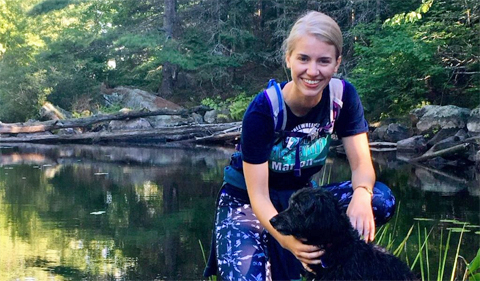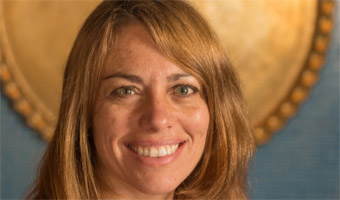Editor’s Note: The Happy Beginnings series features recent College of Arts & Sciences graduates who are getting started in careers, graduate school and service.
In her second year at the University of Chicago Law School, alum Sarah Welch is active in Law Review, Federalist Society, and the Vincent Gambini Society, and she participated on research trip to The Hague.
She will graduate from law school next year, and plans to serve as a law clerk to the Honorable Jeffrey Sutton on the U.S. Court of Appeals for the Sixth Circuit in Columbus, Ohio and to the Honorable William H. Pryor on the U.S. Court of Appeals for the Eleventh Circuit.
Welch graduated from Ohio University in 2016 with a Bachelor of Arts in Music, minors in Physics and Mathematics, and certificates in Italian Studies and Law, Justice & Culture. At OHIO she was an active and accomplished student, leading Ratio Christi, as well as the Music Teachers National Association.
What was your major at Ohio University?
I majored in music through the Honors Tutorial College, and I also majored in the minors: I started with a minor in physics, then discovered I loved the math classes I was taking and added a math minor. When I decided in my third year that I wanted to go to law school, I added the LJC certificate, and thought I’d add on a fourth certificate in Italian Studies while I was at it. It was a weird path through undergrad, but I’m glad I took the chance to study things I was (and remain) interested in.
Where is your hometown?
I grew up in Athens! It’s such a fascinating, cool, beautiful little town.
Why did you choose to attend Ohio University?
It was never really a question for me. Growing up in Athens, I knew the school well, so I understood what a great place it was; I only applied to one school. The Honors Tutorial College was especially exciting to me—it’s a friendly place with lots of support and opportunities.
What made you decide to major in the liberal arts?
I really struggled to decide on my major. I loved playing the piano, but I also loved physics and was really torn between the two. I don’t know that my decision-making process was especially rational, but I somehow decided I was going to at least start out with a music major and think about switching to a physics if I didn’t like music. I ended up being quite happy with my music major, so I never even thought seriously about switching majors. Law school was in the back of my mind as a possibility as I was making that choice, and I knew that path was available regardless of my major.
What were your best Ohio University experiences?
It sounds lame, but student organizations were the heart and soul of my OHIO experience. I invested and received a lot from all my organizations. I was involved in Cru from my first day on campus to my last, and being part of that community was core to everything else I did. I got to run two groups—a Christian apologetics group called Ratio Christi, and a professional organization for musicians, the Music Teachers National Association. Being over-involved made for a busy few years, but student orgs gave me great opportunities to develop professional and leadership skills, and to give back to the community I loved.
How did you become interested in pursuing law?
I doubt I would have even considered law if I hadn’t done mock trial in high school. I loved thinking about the law, crafting the most persuasive arguments I could, anticipating what my opponents would argue, and presenting my arguments before a judge. It seemed to me like a natural and delightful way of thinking about problems. Of course, it was far from the only thing I loved and was interested in, but gradually came to the forefront the longer I spent studying other things in undergrad.
What has kept you busy since graduating from Ohio University?
I went to law school straight from undergrad. I’m a 2L now, and it’s definitely kept me busy!
How did your Ohio University experience prepare you for law school and shape your career path?
Most of my OHIO experience, as a music major, wasn’t particularly relevant to law school. But OHIO gave me incredible opportunities to learn how to think rigorously, to present my ideas, to spot opportunities, and to pursue them. Specifically, I’m grateful to OHIO’s incredibly engaged faculty members who mentored and believed in me.
What do you think were the most important things you did as an undergrad to prepare you for law school?
My courses through the Center for Law, Justice & Culture Certificate coursework were especially helpful. Professor Patricia Gunn’s constitutional law course was taught like a real law school course, and was great preparation. Getting a grounding in legal realism through Professor Jennifer Fredette’s Politics of Law course has proved extremely relevant. Professor Kevin Uhalde’s Roman Law course inspired me to take another course in Roman Law in law school. And Professor Paul Jones’ Law and Literature course was one of the most enjoyable classes I took in undergrad—and, incidentally, left me prepared to nail a cold call just a couple of weeks ago about what Antigone teaches us about modern privacy law.
I would also be remiss if I didn’t mention the OHIO mock trial team, which started just in time for my last year at OU. Every law-interested OHIO student should participate, no exceptions. It’s an invaluable chance to learn about the law, hone legal reasoning and public speaking skills, participate in a rewarding team environment, and learn from the team’s absolutely terrific coaches, Grant Garber and Larry Hayman.
Do you have any advice for students interested in law?
I have three pieces of advice. First, take advantage of opportunities to learn how to work hard, do difficult things, and do excellent work in undergrad. I’m grateful every day for the experiences I had and the broad knowledge base OU gave me. The school is incredibly rich in opportunities; take advantage of them. Hard work pays off, and I’ve never regretted doing my best at something.
Second, develop knowledge about what it means to be a lawyer. Talk to as many lawyers and law students as you can. Work in a law firm or public interest organization. Take classes about law. Pay attention to legal news from resources like SCOTUSBlog and Howard Bashman’s excellent “How Appealing” blog. I started law school embarrassingly ignorant about the legal profession, practice areas, and what it takes to be successful in law school and professional life. I’ve been very grateful for all the pre-law school knowledge I gained, and wish I’d done more. (For what it’s worth, I’m happy to talk to students who are thinking about law school. Feel free to reach out.)
Third, a life tip: figure out how to be content now. Applying to law school is hard. Law school is hard. Being a lawyer is hard. It’s easy to write off day-to-day discontent as situational and tell yourself you’ll be happier and more relaxed when you turn in this paper or finish this term. Not to be too real, but the staggeringly high levels of substance abuse, mental health struggles, and suicide in the legal profession suggest that it doesn’t get better, and that depending on your external circumstances for your happiness is a losing strategy. So figure out how to be content now, and take care of yourself now.
What are your future plans?
This summer, I’ll work at two firms: Williams & Connolly in D.C. and Susman Godfrey in Houston. Then I’ll head back to Chicago for my last year of law school. After that, I’ll spend two years working for federal judges—2019 will be in Columbus, and 2020 will be in Birmingham, Ala. When all that is done, I guess I’ll have to figure out what kind of lawyer I want to be!
What is your favorite Ohio University memory?
Countless late-night runs to Union Street Diner for Oreo milkshakes, fried pickles, and hilarity with precious friends. OHIO is a magical place; soak it up for those of us who have made the poor decision to graduate.




















Comments